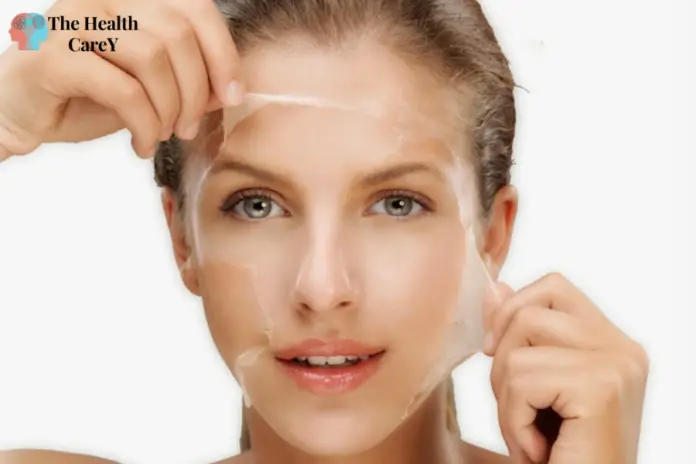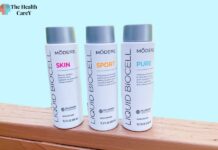Understanding Why Your Skin is Peeling on Your Face After Skincare
If you’ve ever experienced skin peeling on your face after a skincare routine, you know how frustrating and confusing it can be. You may be wondering what’s causing it and how you can prevent it from happening in the future. The truth is, there are several reasons why your skin may be peeling, and understanding the underlying cause is the key to finding a solution.
One common reason for skin peeling is over-exfoliation. While exfoliating can be beneficial for removing dead skin cells and promoting cell turnover, doing it too often or using harsh products can strip away the skin’s natural oils and damage the protective barrier. This can lead to dryness, irritation, and peeling. Another possible cause is using products containing ingredients your skin is sensitive to, such as fragrances, preservatives, or certain types of acids.
It’s also possible that your skin is reacting to a specific product or ingredient in your skincare routine. This can be especially true if you’ve recently introduced a new product or changed your practice. It’s essential to pay attention to how your skin reacts to different products and ingredients and to make adjustments as needed. With a little trial and error, you can find a skincare routine that works for you and helps keep your skin healthy and glowing.
Understanding the Skin
If you’re experiencing peeling skin after skincare, it’s essential to understand the structure and function of your skin. Your skin is the largest organ in your body and serves as a protective barrier against the external environment. It comprises three main layers: the epidermis, dermis, and subcutaneous tissue.
Skin Layers
The epidermis is the outermost layer of skin and protects your body from external damage. It comprises several layers of cells, including keratinocytes, which produce the protein keratin that gives skin its strength and waterproof qualities. The middle layer of the dermis contains blood vessels, nerves, and connective tissue, including collagen and elastin fibres that provide skin elasticity and firmness. The subcutaneous tissue is the deepest layer and contains fat cells that help insulate and cushion your body.
Skin Functions
Your skin has several essential functions: protection, sensation, regulation, and absorption. As mentioned, the epidermis protects your body from external damage, such as UV radiation and harmful chemicals. Your skin also contains sensory receptors that allow you to feel touch, pressure, and temperature. The dermis contains blood vessels that help regulate your body temperature by constricting or dilating in response to external conditions. Finally, your skin can absorb certain substances, such as medications and skin care products, affecting its appearance and health.
Why Is Your Skin Peeling on Your Face After Skincare?
Experiencing peeling on your face after skincare can be frustrating and uncomfortable. There are several reasons why your skin may be peeling, including:
- Over-exfoliation: Over-exfoliating your skin can strip away the natural oils and cause dryness, leading to peeling.
- Harsh products: Using products that contain potent ingredients, such as alcohol or fragrances, can irritate your skin and cause peeling.
- Under-hydrated skin: If your skin is dehydrated, it can cause peeling. Ensure you drink plenty of water and use a moisturizer to keep your skin hydrated.
- Allergic reaction: An allergic reaction to a skincare product can sometimes cause peeling. If you suspect this is the case, stop using the product immediately and consult with a dermatologist.
If you are experiencing peeling on your face after skincare, it’s essential to identify the cause and adjust your skincare routine accordingly. Avoid over-exfoliating and using harsh products, and keep your skin hydrated. If the problem persists, consult with a dermatologist for further guidance.
Common Causes of Skin Peeling
If you’re experiencing skin peeling after skincare, several common causes may contribute to the issue. Understanding these causes can help you identify the underlying problem and take steps to address it. Here are a few potential reasons why your skin may be peeling:
-
Over-Exfoliation
One of the most common causes of skin peeling is over-exfoliation. While exfoliating can be beneficial for removing dead skin cells and promoting cell turnover, doing it too frequently or aggressively can damage the skin’s protective barrier. This can lead to dryness, irritation, and peeling. If you’re using physical exfoliants like scrubs or brushes, try reducing the frequency or intensity of your exfoliation routine. Alternatively, you could switch to a gentler chemical exfoliant like alpha-hydroxy acids (AHAs) or beta-hydroxy acids (BHAs).
-
Allergic Reaction
Another potential cause of skin peeling is an allergic reaction to one of your products. This could be the culprit if you’ve recently introduced a new skincare product or changed your routine. Look for signs of redness, itching, or swelling in addition to the peeling. If you suspect an allergic reaction, stop using the product immediately and consult a dermatologist to determine the best action.
-
Skin Conditions
Some skin conditions can also cause peelings, such as eczema, psoriasis, or rosacea. These conditions are typically characterized by inflammation, dryness, itching, and peeling. If you suspect you may have a skin condition, it’s essential to seek medical advice from a dermatologist who can accurately diagnose and recommend appropriate treatment.
-
Product Ingredients
The ingredients in your skincare products can also contribute to skin peeling. Harsh or drying ingredients like alcohol, fragrances, or sulfates can strip the skin of natural oils and cause peeling. If you suspect a particular product is causing the issue, check the ingredient list and try switching to a gentler alternative.
Preventing Skin Peeling
-
Patch Testing
Before using any new skincare products, it’s essential to patch-test them first. This involves applying a small amount of the product to a small area of skin, such as behind your ear or on your inner arm, and waiting 24-48 hours to see if any irritation or allergic reactions occur. Do not use the product on your face if you experience any redness, itching, or peeling.
-
Gentle Cleansing
When cleansing your face, use a gentle, non-abrasive cleanser and avoid using hot water, which can strip your skin of its natural oils and cause it to become dry and flaky. Instead, use lukewarm water and gently massage the cleanser into your skin using circular motions. Rinse thoroughly and pat your face dry with a soft towel.
-
Moisturizing
After cleansing, it’s essential to moisturize your skin to help prevent it from becoming dry and flaky. Look for a moisturizer that contains ingredients like hyaluronic acid, glycerin, or ceramides, which help to hydrate and nourish the skin. Apply the moisturizer to your face and neck, and allow it to absorb fully before applying any makeup or other products.
-
Sun Protection
Exposure to the sun can cause your skin to become dry and damaged, leading to peeling and flaking. To protect your skin, apply a broad-spectrum sunscreen with an SPF of at least 30 days, even on cloudy days. Reapply the sunscreen every two hours if you’re spending time outdoors or sweating.
When to See a Dermatologist
If the skin peeling on your face persists despite your attempts to remedy it, it may be time to see a dermatologist. They can help you identify the underlying cause of the problem and provide you with a treatment plan tailored to your specific needs.
Additionally, if you experience any of the following symptoms, you should make an appointment with a dermatologist:
- Severe itching or burning
- Redness or inflammation
- Blisters or open sores
- Swelling or pain
These symptoms may indicate an underlying skin condition that requires medical attention. A dermatologist can diagnose and treat various skin conditions, including eczema, psoriasis, and rosacea.
It’s important to note that while some degree of skin peeling is normal, excessive or persistent peeling may be a sign of a more serious issue. If you need clarification on whether your skin peeling is average, it’s always best to err on the side of caution and consult a dermatologist.
Conclusion
Overall, there are several reasons why your skin may be peeling after skincare. By understanding the cause, you can take steps to prevent it from happening in the future.
Firstly, it could be due to over-exfoliation. If you are using harsh products or exfoliating too often, it can strip away the top layer of skin and cause peeling. Be sure to choose gentle exfoliants and limit your use to once or twice weekly.
Secondly, it could be due to an allergic reaction to a product. If you notice peeling after using a new product, discontinue use and consult a dermatologist. They can help you determine if you are allergic to an ingredient and recommend alternative products.
Lastly, it could be due to a lack of moisture. If your skin is not adequately hydrated, it can become dry and flaky. Be sure to use a moisturizer appropriate for your skin type and apply it regularly.
By taking these steps, you can help prevent your skin from peeling after skincare and maintain a healthy, glowing complexion.
Also Read:
What Causes Skin Tags on Neck?
How To Get Super Glue Off Skin?





















